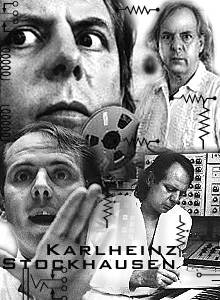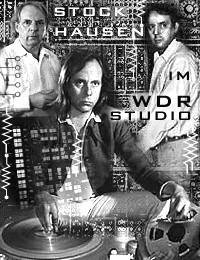D>Elektro 1.2 - |> extended concept <|
|>NEWland
| "One
of the most notable influences on the early German rock groups was
the central figure of Karlheinz
Stockhausen. As leader of the Darmstadt school, his influence
on the electronic music field was immense. His experiments
with electronic sounds were also influential
on rock musicians further afield. His picture being one of those
included on the cover of The Beatles' 'Sgt. Pepper' LP. Fluxus artist like LaMonte Young, Jon Hassell and Tony Conrad from New York, were constant visitors to Germany. Conrad even went on to record an album with the German band Faust." Pascal
Bussy |
 Stockhausens influence on this generation of young musicians has been widely acknowledged - though, of course, there area also musicians who don't feel influenced or inspired by him at all.
Hardly surprising, with a "debatable" and "provocative" figure, as Stockhausen is up til today.
Stockhausens influence on this generation of young musicians has been widely acknowledged - though, of course, there area also musicians who don't feel influenced or inspired by him at all.
Hardly surprising, with a "debatable" and "provocative" figure, as Stockhausen is up til today.
The influence, however, mostly showed up in initializing radical thinking and experimenting - and less in the actual music.
Every tone, every dound, every noise could become music - not a self-evident truth, particularly for music-students, particularly at that time.
Holger Czukay and Irmin Schmidt from CAN were among his students, so were Ralf Huetter, Florian Schneider and Karl Bartos from Kraftwerk, who studied his works.
| "...Than I thought "I am
not a natural-born jazz-musician. This is not my world' So, who was
left? Only Stockhausen - the most fascinating
figure. He invited all those composers like John Cage to Berlin
(1962). They gave concerts and talked about their ideas. John Cage
was unbelievable. For some months there was a gathering of the most
important composers and I got deep insights
into their work."
Holger Czukay [CAN] |
|
"I've started then to construct new sounds, to manipulate and transform them. In Cologne I'd begun to build new sound-spectrum's with simple sine-waves.
I did layer pure tones upon each other - and by that composing new sounds. This, of course, has been developed a lot during the last 50 years." Karlheinz Stockhausen |
 Dissolving the traditional compositional structures in favour of concentrating on the (new) SOUND itself, as well as using the WDR studio for electronic music as a composer's INSTRUMENT, were Stockhausen's most important impulses.
Dissolving the traditional compositional structures in favour of concentrating on the (new) SOUND itself, as well as using the WDR studio for electronic music as a composer's INSTRUMENT, were Stockhausen's most important impulses.
And also 'in-tune' with the slowly upcoming student's movement, those young generations of musicians were looking for a way to liberate the sound from the stifling conventions of traditional, academical music-'production'.
| D>Elektro |1.2.1| |>NEWland<| |
| |> Excursion: Impulse + Influence: Stockhausen <| |
| <| ...Newland... |> | |
| <| Rwd: | NEWland > Sounds out of the void | | |
| |> Fwd: | Expanding the music > Everything is sound | |